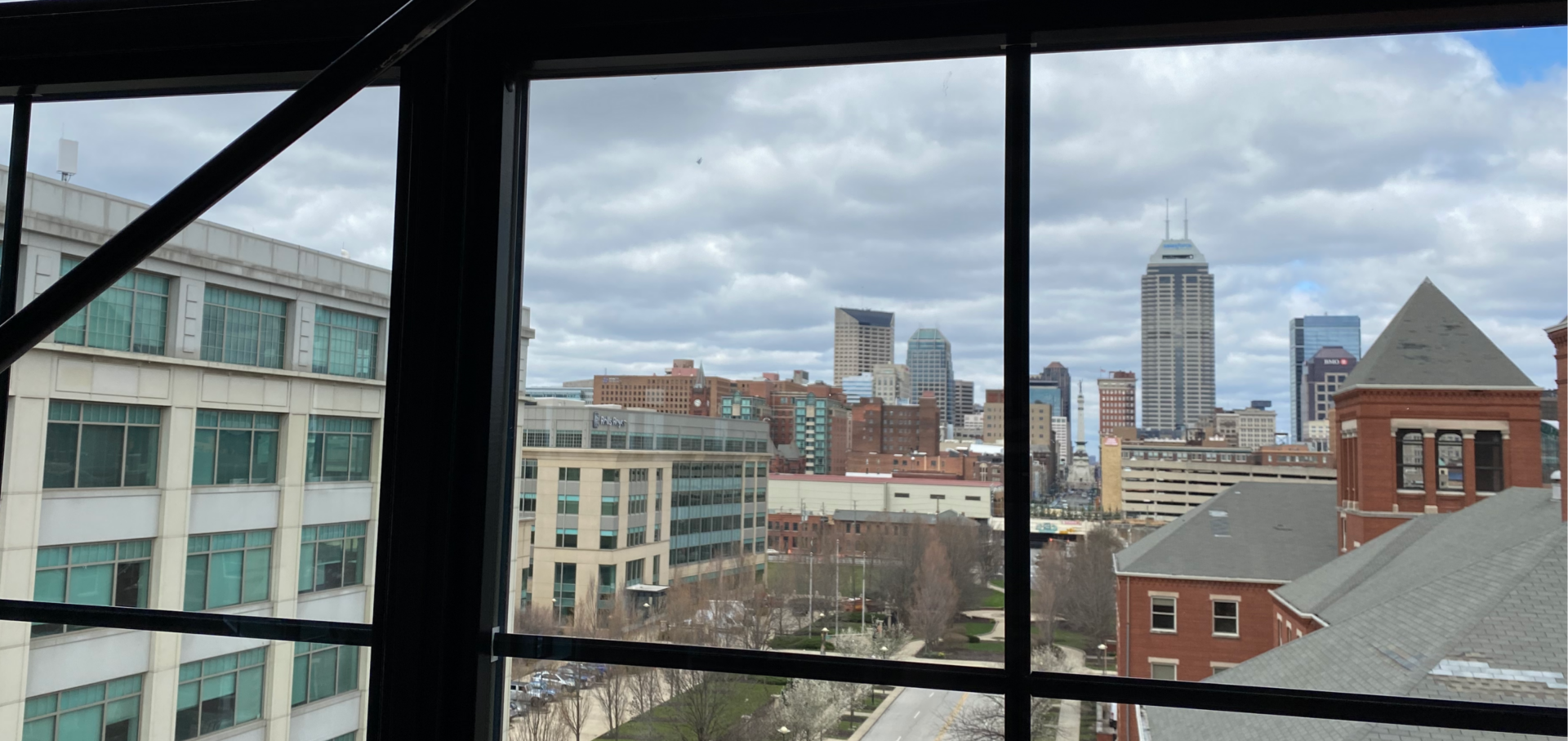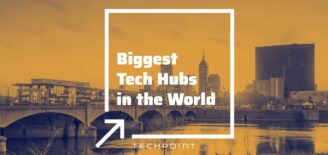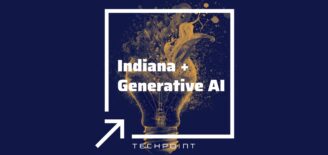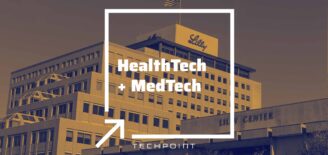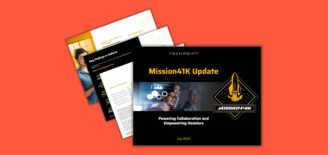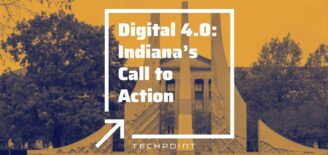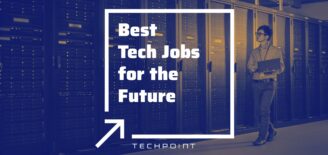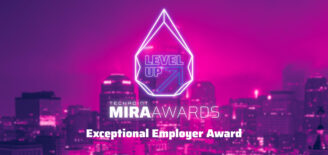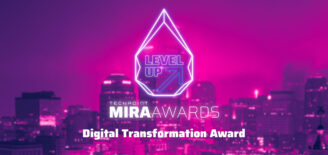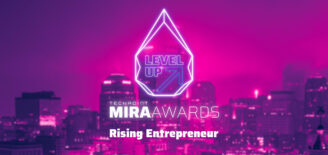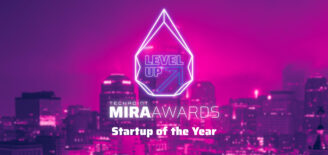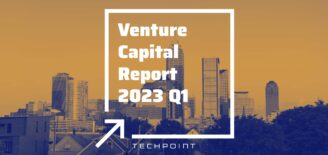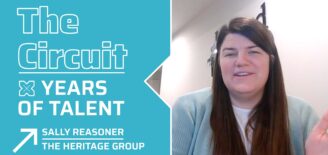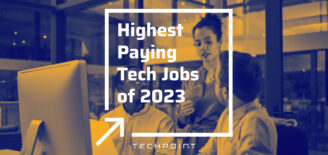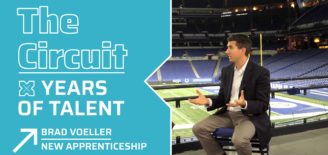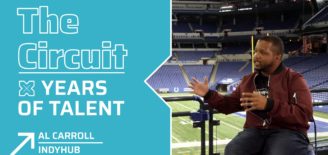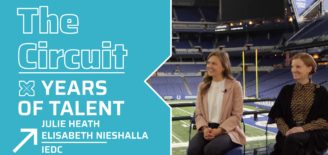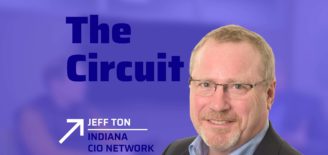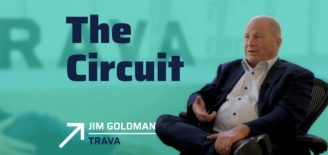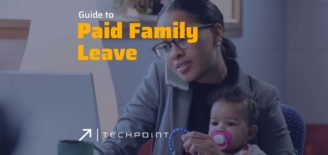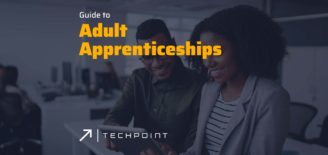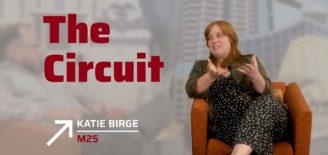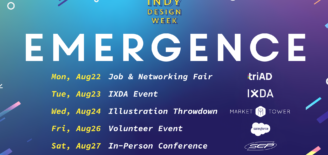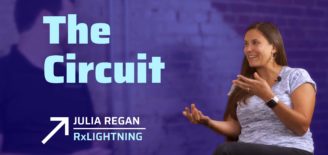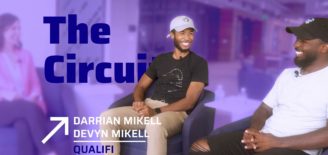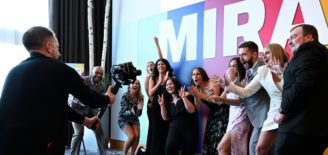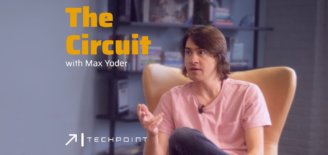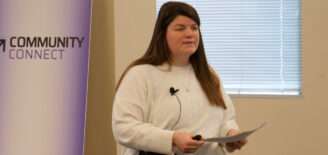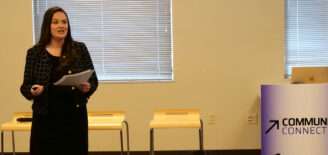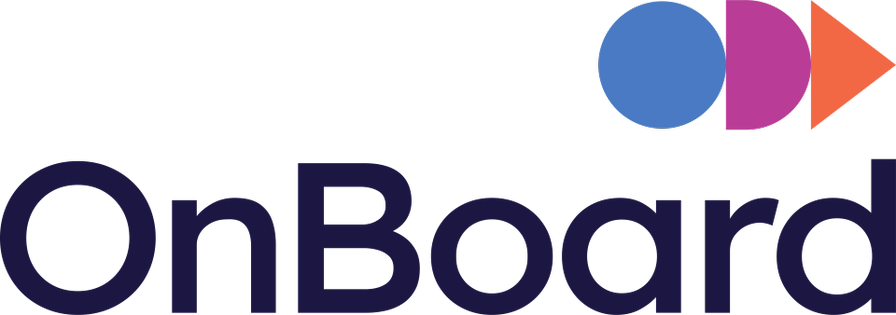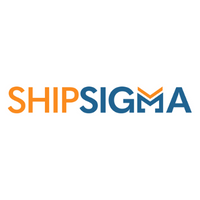How Downtown Indy Tech Companies Plan to Move Forward From the Pandemic
Finding and retaining talent. It’s one of the biggest challenges facing corporate America today. It’s affecting every sector, and for tech it occupies countless hours of strategic planning and effort as business leaders try to figure out how to adjust to the demands of a tight labor market and employees who can literally work from anywhere.
We talked with six downtown Indianapolis tech companies to check the pulse of how they’re responding to the talent challenge. We also talked with downtown development officials about the ripple effect remote work options have on the community.
As 2020 dawned, some 150,000 professionals were found in downtown Indianapolis on workdays, packing parking garages, filling offices, and providing robust traffic for coffee shops, restaurants and bars, according to Bob Schultz, interim president and CEO of Downtown Indy Inc.
The pandemic dropped that number below 20,000, he said. Even though many companies have brought workers back, at least in a hybrid way, downtown has yet to fully rebound.
Large tech companies see value in hybrid and in-person work
Tech professionals make up approximately 20 percent of the downtown Indianapolis workforce, Schultz said. Major tech employers like Salesforce and Ultimate Kronos Group (UKG), both of which offer remote work flexibility, have launched initiatives to encourage their teams to come back into the office.
“Over the last several months we’ve re-opened offices where it was safe to do so and have invited U Krewers back to the office on a voluntary basis — what we’re endearingly calling ‘Return to Each Other’, instead of the commonly used RTO (Return to Office),” said Doug Ding, senior practice director with UKG. “Specially in Indy, we’re recommending employees come in at least two days a week, and we’re working hard and creatively to provide reasons to return to each other.”
Those reasons range from gift card raffles to complimentary breakfasts. Ding said being in the office face-to-face is important, especially for new hires and professionals just starting their careers. Ding has hired about 70 new team members at the Indy Tech Center and is focused on giving them a place to network, learn, and grow.
UKG celebrates 10 years of operations in Indianapolis this year, and plans to hire 200 additional employees by 2023 on top of their current crew of 350.
San Francisco-based Salesforce is closing in on its first decade in Indianapolis, having established a major presence through the game changing acquisition of ExactTarget in 2013. Like UKG, Salesforce sees the value in flexibility while simultaneously wanting to provide quality in-person work spaces.
“The past two years have challenged us to reimagine not only how we work, but also how we connect — and what it means to build a culture in an all-digital, work-from-anywhere world,” said a Salesforce spokesperson. “Parents see more of their kids, recent graduates live in affordable cities, and individuals make more time for wellbeing.”
Moving forward, Salesforce will implement its “Success from Anywhere” approach, giving teams the power to decide how, when and where they work. The ultimate goal is for the majority of their employees to come into the office one-to-three days each week.
Both Salesforce and UKG see value in continuing to invest in and expand their presences in Indiana, and in downtown Indianapolis because of their access to a deep talent pool but also because of amenities like great restaurants and entertainment, networking and a relatively easy commute and affordable housing.
“Outside of what everyone knows about Indy’s low cost of living, tech professionals should know that they can build their careers in Indy, and they’ll be supported by not only their own company but other organizations as well — such as TechPoint, IndyHub, and Indy Women in Tech,” said Ding of UKG. “It’s a great place to start your career and continue to grow. And with the majority of global tech organizations like UKG offering flexibility, while your body and mind is in Indy, you’re working with top talent and customers from all over the world.”
Starting and growing in downtown Indianapolis
Greenlight Guru’s name adorns one of downtown’s newest office buildings: the Union525 coworking complex near Lucas Oil Stadium.
Launched from The Stutz, the medical device quality management SaaS company moved next to the original Union525 building. They’re now in a shiny, new office at 601 S Meridian St.
“It’s been an awesome and fun ride. We’ve seen tremendous growth over the years,” said Nick Tippmann, chief marketing officer with Greenlight Guru. “About eight years ago the tech scene was very different; there was a lot of energy and activity around the SaaS space and it’s been fun to see a lot of those companies grow into these larger companies.”
Greenlight Guru has, itself, seen considerable growth in recent years, thanks in part to an eye-popping $120 million investment from JMI Equity. One of the 10 Indiana tech companies with the most job openings listed to TechPoint’s Job Board in Q1 2022, Tippmann is excited about growth opportunities.
“I think being downtown has attracted a certain type of team member, people getting out of school and moving and living downtown,” he said. “We rode that, and have been able to attract a certain profile of employees with young professionals coming out of the amazing network of schools we have here in Indiana.
In early 2020 Greenlight Guru was a completely central Indiana based team operating on downtown’s south side, but a few short months into the pandemic they quickly realized two things: 1. They likely wouldn’t be going back to the office full-time for a while, and 2. the company operated pretty well on a remote basis.
“Everyone was as effective and efficient, and the culture was still healthy,” said Tippmann. “We took a ‘wait and see’ lens on the when, if, and how we would come back to work, we kept a pulse on the market and what other companies were doing, and then we also wanted to hear from our employees.”
In an effort to accommodate all employees, Greenlight Guru is adopting a hybrid model. Greenlight Guru employees coming to the office three days or more per week are rewarded with their own, permanent desks. Those who report fewer days use the best desk that’s open to them.
Expanding with hybrid work in mind
OnBoard may not have gotten its start in downtown Indianapolis, but its team sure is happy to be there now.
“Being centrally located is huge. People are OK paying a premium to live in this area and be able to walk and bike places, and not need to drive everywhere,” said Nancy Gutwein, director, people ops, with OnBoard.
The board management and meeting software company got its start in Lafayette, Ind., in 2003, and moved its headquarters to Indianapolis in 2019. OnBoard still maintains a presence in Lafayette, and previously had multiple office spaces in Indianapolis before consolidating into one office in the Regions Tower. They recently moved to their new home on Massachusetts Ave. in the old Sears Roebuck Building.
Like Greenlight Guru, you may have seen OnBoard in the headlines in 2021 after they brought in an attention-nabbing $100 million investment from JMI Equity. OnBoard was one of the top job posters to TechPoint’s Job Board in Q1 2022, and expects to see more growth moving forward.
“Some of our positions are heavily invested in Indianapolis staff, and some positions we have less preference,” said Gutwein. “One of our values is the culture of togetherness. So when we think of what that means to us is that we believe in the power of collaboration, the one-offs that aren’t scheduled or planned. The solutions that are thought up; things like that aren’t replicable.”
In early 2020 Gutwein had been keeping a close eye on the developments surrounding COVID-19, primarily basing her decisions on what universities were doing. The OnBoard team had multiple scenarios planned out. Gutwein remembers one day in particular because employees who wanted to and felt safe coming to the office were allowed to do that. By that evening though, in response to conditions at the time, everyone was advised to “go get your stuff and don’t come back to the office.”
After staying closed for most of 2020 and 2021, evaluating different work situations, OnBoard is moving forward with a hybrid game plan. “Instead of saying ‘come in whenever you want’, we have standard days where things are going on like Tuesdays and Thursdays,” said Gutwein. “We’ve stuck to having cross-functional events and meetings on those days so people can plan accordingly.”
Gutwein predicts the hybrid models will remain in place and says flexibility is key because one-size-fits-all models don’t work for everyone. Ultimately, providing both the freedom of staff choice as well as that hub where the team can all come together is the path forward, and OnBoard is happy to be on it.
Invest where people want to be: downtown
Chase Flashman, co-founder and CEO of ShipSigma, is excited to have his company downtown. ShipSigma, a scale-up tech company that helps high-volume, UPS and FedEx parcel customers cut costs without changing carrier service levels, got its start in a small office space on Mass Ave before setting up shop in the Wholesale District.
“We want to pin our flag here,” said Flashman. “ We wanted to stay downtown because I lived north, my co-founder lived south. But this is the hub. I can look out and see Salesforce Tower. We have this partnership with the IU Luddy School of Informatics, Computing, and Engineering, so our interns can walk right over from campus. And as we’re hiring, some folks might be recent grads and they want to be downtown.”
Being downtown provides opportunities office locations further away don’t provide – major sporting events, huge concerts, the presence of other tech companies and proximity to major businesses in various industries. Flashman likes the opportunity to bring his team together for more than just work, and he loves that they can spend time together experiencing all that downtown Indianapolis has to offer.
The ShipSigma team works on a hybrid model currently, but Flashman has dreams of an office space that makes his staff crave coming into work. “We’ve already outgrown our space,” he said. “We’re looking for more space now; we don’t want to expand on the coasts or even in the local suburbs. We’ll continue to grow here. With our dramatic hiring plans, we’re going to see people living in or close to downtown.”
Instead of leaving Indiana, they chose downtown Indianapolis
The Bee Corp, an IoT and data analytics start-up that uses thermal imaging to monitor the health of bee colonies, was co-founded in 2016 by CEO Ellie Symes and COO Wyatt Wells on the campus of IU-Bloomington. After three years of operating in Bloomington they decided to search for a new home in which to grow the company.
“We looked at Denver, Sacramento, Indy, and [staying in] Bloomington,” said Symes, winner of the Rising Star at the 2018 Mira Awards. “We evaluated the pros and cons of each, the cost of business, the talent pool, the cost of business, and the proximity to our customers. And what we didn’t find anywhere but Indy and Bloomington was the community that could help us tap into start-up resources. That is very well defined in Indiana, and not as well defined in these other ecosystems we were looking into.”
The Bee Corp relocated to the Union 525 in 2019 due, in large part, to improved access to a high quality talent pool.
“I love [being downtown],” said Symes. “One of the coolest things about Indy is how affordable it is to live this close to downtown. I can walk to every key entertainment district downtown, or better yet scooter or bike. Most U.S. cities don’t have the housing to make that accessible, or the cost of living prohibits it for young professionals.”
The Bee Corp has worked on a hybrid model since before the pandemic, but Symes said she likes what downtown can offer her team. “We wanted to make sure the company was close to places employees could eat, close to other tech companies, and close to things where fun events are going on,” she said. “What’s been nice is that our employees live all over the city, so that means that no matter where in Indy you live you’re not much more than a 20 or 30 minute commute away.”
Having operated partly remotely since before COVID-19, with some staff located outside of Indiana, The Bee Corp was well prepared to go fully remote in early 2020.
“Some people needed to get used to the new setting, and challenges that come from working from home,” said Symes. “But quickly we also saw all the benefits of it, and how happy people were to be around their families, not having commutes, being able to stop work right away and go into what they want to do.”
The Bee Corp reopened its office in 2021 to those who wanted to come in, but the Delta and Omicron variants drove people back home again. Symes said these challenges have led to the whole team trying to figure out what work situations are best for them, and what they will do moving forward. She is adamant that whatever decisions are made will add benefit to the entire team.
“It’s important,” she said, “to remove yourself from the decisions, and look at what the team wants and what’s best for them.”
Growing opportunities to live and work in downtown
Before the pandemic downtown Indy was generally abuzz throughout the work day and into the evening. The number of downtown dwellers was increasing too, as evidenced by a plethora of new apartment and condominium projects. Healthy urban centers include housing for people from all demographics. The rise of housing developments indicates Indianapolis is meeting demand for downtown dwellers, whose consistent presence will be complemented by sports fans, diners, convention-goers and others who visit the various amenities.
According to Downtown Indy Inc. one fully residential development and one mixed-use project were completed in 2021. On top of these developments downtown saw 39 permits pulled for renovations, expansions, conversions, or new builds in 2021; this compares to only 20 permits pulled in 2019 and 21 permits pulled in 2020.
This growing ability of residents to live downtown mixed with the growth of hybrid work models means that someone can work for a company with its offices downtown, but they can also work from their downtown home as well. Downtown Indy Inc. considers these individuals living and working downtown part of their official downtown workforce count even when they’re working from home.
People like this help strengthen the economy, meaning that even when offices aren’t packed with staff there will be a growing number of downtown residents working from home still going grocery shopping, still grabbing coffee downtown, and still getting food at downtown restaurants.
“I think the majority of my friends live and work downtown,” said Naomi Gollmer, PR specialist with Greenlight Guru, who does not live downtown. “When I want to do something, I come downtown.”
She said the attractiveness of Indy’s downtown was a common talking point when she was in college. “It was known that tech is up and coming and you want to get in now,” she said. “That’s a message people are talking about with students and professors.”
Making sure urban centers around Indiana, and our Indiana tech ecosystem as a whole, remain things university students and others pursuing careers in tech desire is crucial moving forward as the efforts to attract and retain talent continue.

